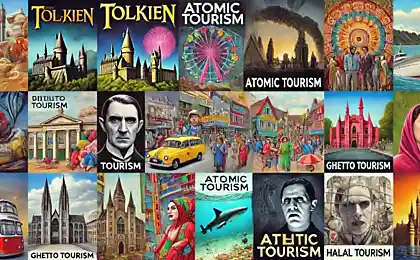224
Yoga tours in Saransk instead of Milan: what really happens in the Russian travel industry

© Benoit Challand
The events of 2014 had a significant impact on the situation in the Russian tourism industry and travel startups. Closer to the New Year holidays, public sentiment on this occasion approached a state of hysteria: people massively cancel vacations and hand over tickets, and tour operators seem to have nothing left but to count losses. The participants of the December Moscow Tech Meetup discussion on the tourism industry tried to answer the question of what is really happening: a crisis or a natural restructuring of the market. T&P publishes their thoughts on new trends in the context of sanctions and rising exchange rates, the level of education of the Russian online audience and real problems. Andrey Osintsev: The industry is bad now in many ways. Previously, business was built on fundamental things such as revenue equals income minus expenses, now there are examples of successful investments on the market, including foreign ones, which work with a slightly different strategy of increasing turnover. Tour operators thought that everything will always be great, at one point it became bad, and everyone was not ready: it is a question of management efficiency and approach to business. The imposition of sanctions had a huge impact on the economy: four million non-expatriate civil servants appeared, and the companies that served them were the first to feel this. The series of bankruptcies began last year with Eviterra, then the sanctions season began. This leads to two problems. First, it is unclear where the rising dollar and euro exchange rates, which changed the budgets for the New Year. Second, the crisis of consumer confidence: it is unclear who to go to buy, because the tour operator at any time can say: “Sorry, we did not pay for you.” In my opinion, foreign investment, however small, will stop altogether. Russian investors will probably support this for some time. Evgenia Belenkaya: Russia occupies a rather small share in Expedia, despite the size and growth of the market. And we see an even decline of the same number for all our partners. If earlier the New Year was planned immediately, booking the same hotels on arrival from vacation, now there are a lot of spontaneous trips. Next year will be not just without growth, but with negative growth. The market and the balance of power on it are changing: small players will leave, and it is time for tour operators to retire. Drunk tours are also not very popular: what is happening and the course have done their dirty work. We can see from the technical trends that Russia has done in three years what Europe has been doing for fifteen years. This applies to marketing, mobile devices, customer loyalty. My prediction is that next year will be a terrible one, but in 2016, those who survive will have everything back in numbers, turnover and investment.
We are witnessing a sharp jump in the growth of Russian destinations. Ukraine, Kiev and Odessa were very popular, which unfortunately is now dead. Crimea died for other reasons, although the people want to go there. But, since there is no banking system, hotels physically do not have the opportunity to calculate and pay commissions to suppliers. Everyone has heard the story that one company, let’s not name it, just drives with a suitcase of cash. This is probably the only way to work right now. But in the near future there will be no sane banking sector, which will allow white companies to receive commissions.
Janis Zenis: I don't want to be a black bird of terror that soars above the audience. Aviasales, like Alice in Wonderland, has always tried to run several times faster without spending more than earning. These are key things for 2015. We are seeing a huge redistribution towards domestic tourism. In addition, year after year, there is a funny story when search queries show that Russians want to be in Bangkok, Goa, Prague and Paris. And buy Mineral Water and Sochi. Don't laugh about it, because we have some cool places to visit. And I'm sure these changing consumer habits do a lot of good for us. From the point of view of ticket prices, fantastic situations also occur: for example, Wizzair, which carries to Budapest for 4 thousand rubles, continues to do so. Or more recently, Transaero issued fares for a direct flight to Bangkok in December for 20 thousand rubles, which was not the case with a softer dollar.
Of course, we will need to work much harder next year. The mobile part of Aviasales, and I think all colleagues note this, is growing at a wild pace: at the moment it is 45-47%. But I’m not sure everything will go wild because there are only ten million people in Russia who fly. This number is likely to decrease next year. Let's get ready.
Valentin Dombrowski: My personal experience of buying airline tickets has shown that airfare prices have decreased, but I think it’s because airlines have a flight plan and need to fill the planes. The number of flights is likely to decrease next year. The Russian market in terms of flights is comparable to the market of Austria: a small European country. Germany, America and so on are very far away. Especially far away online. Basically, Excursiopedia services continue to buy offline locally, even overseas, we are trying to bring this to the web.
There is a general decline in tourists heading to Europe. We also see a reorientation to domestic destinations and expect to increase the number of proposals here in 2015, including through cooperation with state organizations: we are already communicating with the Moscow Tourism Committee. Not far off and 2018 with the world Cup. At this point in Moscow and not only have to build a certain number of hotels. These hotels are not going anywhere, and after they will need to be filled.
Therefore, there is a task to raise interest in Russia as a tourist destination.
Intourist, for example, is developing so-called city breaks in Moscow, and we also want to cooperate with this. We have resources for development in Russia and abroad, we are integrating into metasearch services and looking for partners.
Armen Dzhanumov: In fact, we're getting frustrated. Only twelve million Russians have a passport: that is, people were not supposed to fly. Our services are not only used by Russians. Accordingly, in its pure form, we have even fewer people. I'm not talking about visas.
If we imagine that the dollar and the euro did not jump anywhere, we still see a decrease in the average check by 10-15%. And this is not only because people are beginning to save money, but because we have cheap offers from low-cost airlines and discounters, which make it possible to fly to London for five thousand rubles. The market is becoming more differentiated. It is clear that a ticket to Nice cost and will cost, no one will let there any discounter. But we have a clear picture when the user is given a choice. There is also a premium economy class - almost a business fare. Two years ago, we didn't have all that. We never think that one compensates for the other, but immediately shout “give it back.” There are things we can’t do anything about. Like the war.
Last year, I flew to Thailand for $30,000 in December and didn't really resent it. It’s the same now, just a little less people. And you will fly away for the same money, and if you convert it into a dollar, it is even cheaper. Not a situation to be upset, we would survive. We are in the IT industry, and if you don’t want to, you will develop according to the laws of the market, which will run forward. In fact, we will not lose tickets: yes, we have not grown since May, but we have not stagnated in terms of their number: Yerevan has grown 2.5 times, St. Petersburg has taken off, with Simferopol in general the feeling that everyone flies there. I really want the insane number of hotels that remained after Sochi to appear in two or three more cities, because now some domestic destinations look like bullying. If we stay positive, light industry will die out, all car manufacturers will leave, but we will stay afloat for another three or four months: to leave Russia, they will need somewhere to buy tickets.
Janis Zenis: This tone is absolutely perpendicular to the tone in the information space. Every other day I get calls from different media outlets and talk about nightmares about ticket prices. And when I explain to them that pricing is different, that there is no need to worry, they are no longer interested. Globally, it seems as if there is a need to write everywhere that we will all die, we will not go anywhere, Sochi and nothing more, a negative balance of passengers flies to America in general. I can’t say that it has nothing to do with reality, but what gets in your head makes things a little more complicated. Therefore, in addition to business intelligence and technical things, it is very important to closely monitor what is happening in the information field.
Armen Dzhanumov: Absolutely. In general, the travel startup group cannot but reflect a certain Russian “facebook” painted in the colors of the devil. All we can do is keep him out. People will not be flying less globally at this stage, they need a rest. Owners of planes, airlines, and everyone involved will have to save money to keep 80 percent of the people who fly. Business trips could get smaller.
Andrey Osintsev: Yes, the media does not like good news, but there are statistics that 57% of Russians refused to travel for the New Year in favor of their own savings. The average check in the domestic market is completely different, I say this on behalf of a company that sells 90% of domestic destinations. Sochi is a wonderful region that was in the top, now Simferopol appeared, simply because there is no other transport there. Of the four million people who travel there every year, one has arrived. Infrastructure was built only in Sochi and Kazan, and the rest? It's all philosophy. Why does OneTwoTrip not share or communicate? You do not just sell insurance and additional services. This is also a problem in the market. You say, “We’ll do something, and then you copy it, and everyone will be fine.” This is the wrong position, I will say.
Evgenia Belenkaya: In Russia, there are only 4.5 thousand hotels in their classical sense, which have at least one star. The whole big country. I'm not talking about sanatoriums, houses of culture and recreation and everything else. Have you seen Elbrus? It's fear, nightmare, shame and horror. Even if I don’t have the money to go to Austria, I won’t go there: there’s nowhere to live there, and there won’t be another 20 years. The UTair fell off. And who else would fly to the region? How long can I go to Sochi? Swallows has been cancelled there, and how will you get to your five-star Marriott? Yes, it is necessary to develop domestic tourism, the reorientation is underway, but this market, unfortunately, is limited. People who are engaged in the 2018 World Cup are now driving to these places. Rostov, Saransk - it's just hair on end.
I would love to go to Baikal, but it costs 10 thousand dollars. For that money, I'll be traveling to South America for a month.
Personally, I believe in niche tourism. Everyone has to do their own thing. And if you’re not a giant, but a startup that needs to survive, you can’t compete. But if there's something that only you can do, like yoga tours in Saransk, it's very cool, because you'll do better than Ozone's 155th competitor, even with millions.
Andrey Osintsev: Dmitry Yakovlev from Ozone said a week ago that they have the longest flight to Makhachkala, and they do not need to make a mobile application. It’s funny to have 150 million invested in you and it’s not about making money, it’s about maybe something sticking to those who leave the market. This strategy is clearly visible in the example of their “Yandex.Direct”. The way they “know” how to make money leads to soap bubbles that just burst.
Janis Zenis: Max Krainov, CEO of Aviasales, says that Russia is a wonderful country because you can make a lot of money without being rude to your client. And Kostya Kalinov at a recent conference said that one of the problems of the Russian travel market is that everyone ran immediately to make ozone, Amazons, rushed to sell insurance, and niche services and no. There is, for example, a need on arrival: you have an empty fridge, the shops are closed, and you go home hungry and suffering.
Valentin Dombrowski: There are things about infrastructure development that we cannot influence. Interaction with the Committee on Tourism of Moscow showed that the whole state machine is far from homogeneous. They are difficult to work with, but what to do?
Andrey Osintsev: The most popular question from people traveling to Europe right now is “How much extra luggage costs?” On the issue of sanctions.
Airlines should pack the service "Additional baggage of ham and cheese".
Flocktory launched a similar story: some promo codes that appear after a purchase. This trend started a few years ago in the West.
Armen Dzhanumov: If you describe without philosophy how we distract people from all this nonsense, there is nothing cooler than a freebie. I kept the budget for the super genius card, but then I realized that it is not worth spending money on it, but rather give it to the client. Now we give a discount of five thousand rubles, it works. We were the first to integrate history where the traveler's card is not a bending story towards the bank. Now the salary project, the accumulation of bonuses and the pleasant joy of spending them will be combined in one product. If you earned a lot before the crisis, and then threw money on the card and they are dead weight, then this turns into a bonus and a positive.
Another trend: 50% of people open email from an iPhone. I had to delete anything on my phone that might scare me away, leave big buttons and write “Yes, do it!” And people do. We will always emphasize that we have great respect for our competitors, but we love our loyal customers. And we will always go to zero or negative, but move in their direction.
We have a margin, God forbid, of 2-3%. The market is built in such a way that whoever you are, you have to consider that there are metasurchers who are very popular. On the one hand, they give a cool idea to the user - choose the best, on the other - there is no guarantee that this company will not go bankrupt tomorrow. Hotels are difficult for us to climb, because we have Booking.com in our country: it is very difficult to change people. So other than an apseil, you're not going to sell anything.
Andrey Osintsev: Yeah, it's hard to be a pioneer. Many people say they buy tickets from Yandex and Internet Explorer. The level of online education is not too high. The new buyer of the E-ticket is now worth more than a thousand rubles. The question is when will you pay for it? In the first year, we burned a million dollars on TV: sales rose 10 percent. These are product placement, audience coverage and other metrics. Marketing requires analytics and data, so I encourage everyone to think.
There is another trend - the death of tour packages. People begin to search and book independently: a ticket separately, a hotel separately. After the crisis of 2008 in Europe, 70% of tour packages are dynamic. Audience requirements are growing and requests are becoming flexible. We're going to build on that and close the standard tours.
Evgenia Belenkaya: The main thing is that we are not limited. The law on tourism and tourism activities, for example, is now written by people who wrote the law for gambling. The law on personal data was supposed to come into force on January 1, but its adoption was postponed until June 2016. My personal opinion is that he is behind the fight against big foreign players like Booking.com. But this is not physically applicable: e-commerce, travel, everything suffers. That is, some “Ecuador Airlines” left everything and went to register their servers in Russia. Yeah, sure.
Source: theoryandpractice.ru























